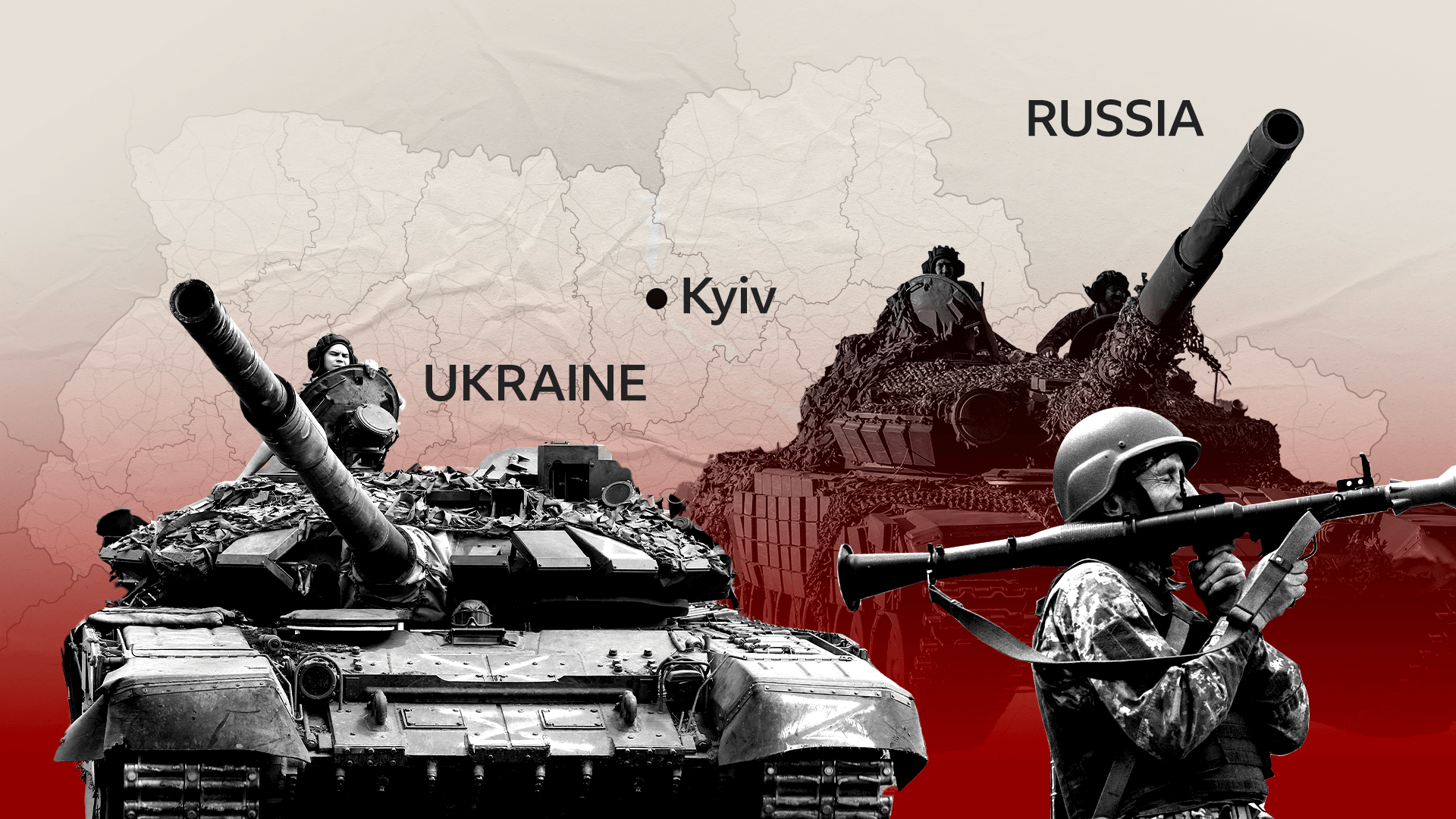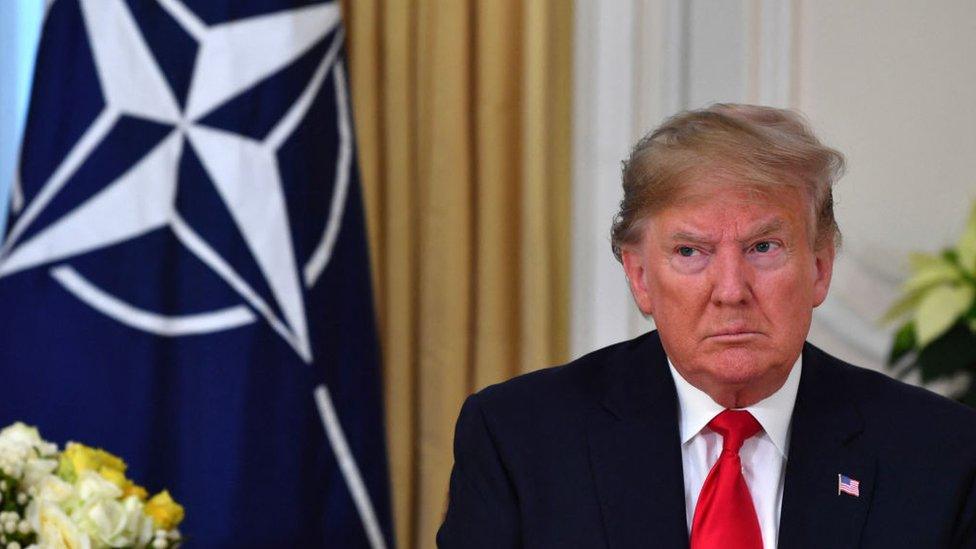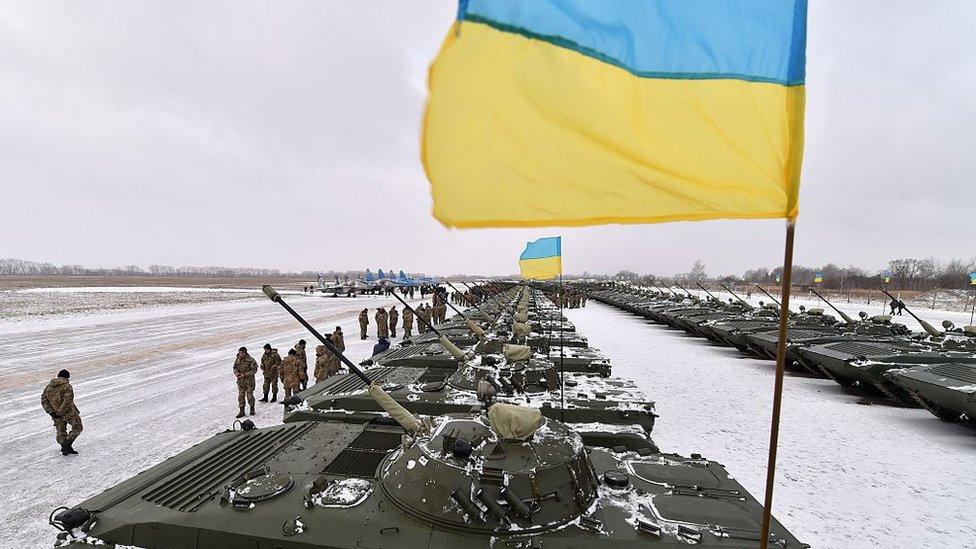Ukraine war: Five ways Russia's invasion may play out
- Published
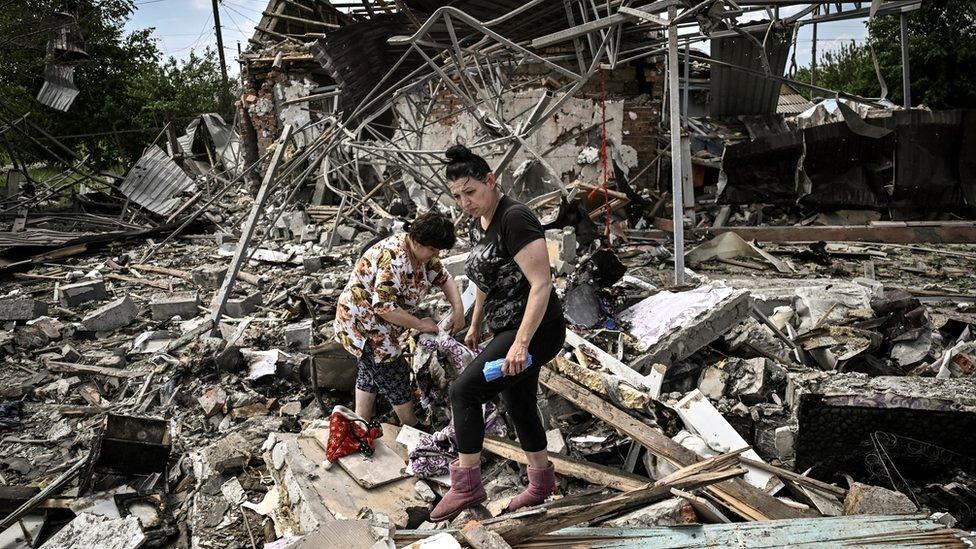
Residents look for belongings in the rubble of their home after a Russian strike in the eastern Ukrainian region of Donbas
Wars ebb and flow. Vladimir Putin's invasion of Ukraine is no exception.
Early fears of a swift conquest were succeeded by Russian retreat and Ukrainian resistance. That has now been met by a more focused Russian offensive in the east.
But 100 days on, where might this war go next?
Here are five potential scenarios - they are not mutually exclusive, but all are within the bounds of plausibility.

1: War of attrition
The war might continue for months - if not years - as Russian and Ukrainian forces grind each other down.
Momentum shifts to and fro as both sides make gains and losses. Neither side is willing to give up. Russia's President Putin judges he can gain by demonstrating strategic patience, gambling that Western countries will suffer from "Ukraine fatigue" and focus more on their economic crises and the threat from China.
The West, however, shows resolve and continues to supply Ukraine with weapons. Semi-permanent front lines are established. Steadily the war becomes a frozen conflict, a "forever war".
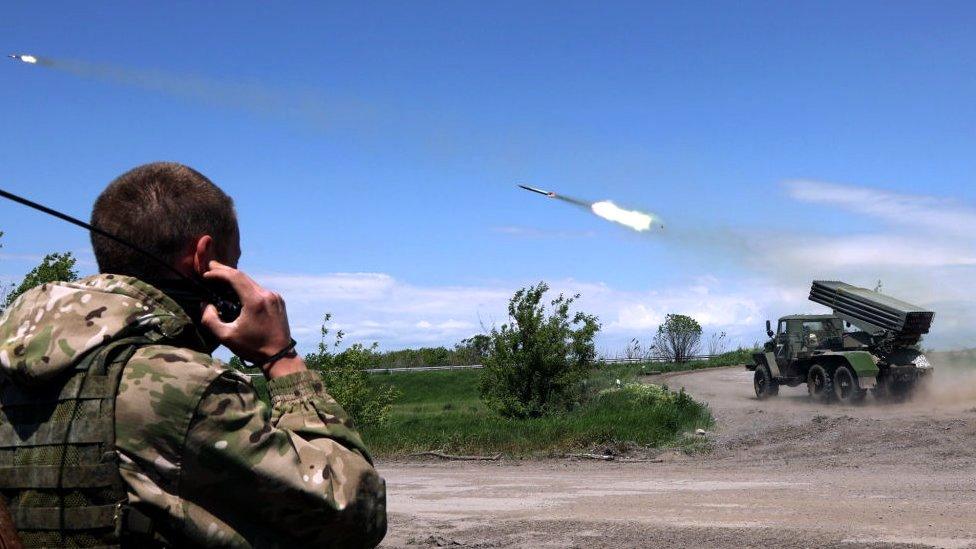
Pro-Russian forces fire a rocket targeting Ukrainian positions in Yasynuvata, Donetsk
Mick Ryan, a retired Australian general and military scholar, says: "There is little prospect of a crushing operational or strategic victory by either side in the short term, external. Neither belligerent has demonstrated the capacity to land a strategically decisive blow."
2: Putin announces ceasefire
What if President Putin were to surprise the world with a unilateral ceasefire? He could pocket his territorial gains and declare "victory".
He could claim his "military operation" was complete: Russian-backed separatists in Donbas protected; a land corridor to Crimea established. He could then seek the moral high ground, putting pressure on Ukraine to stop fighting.
"This is a ploy which could be used by Russia at any time, if it wants to capitalise on European pressure on Ukraine to surrender and give up territory in exchange for notional peace," says Keir Giles, Russia expert at the Chatham House think tank.
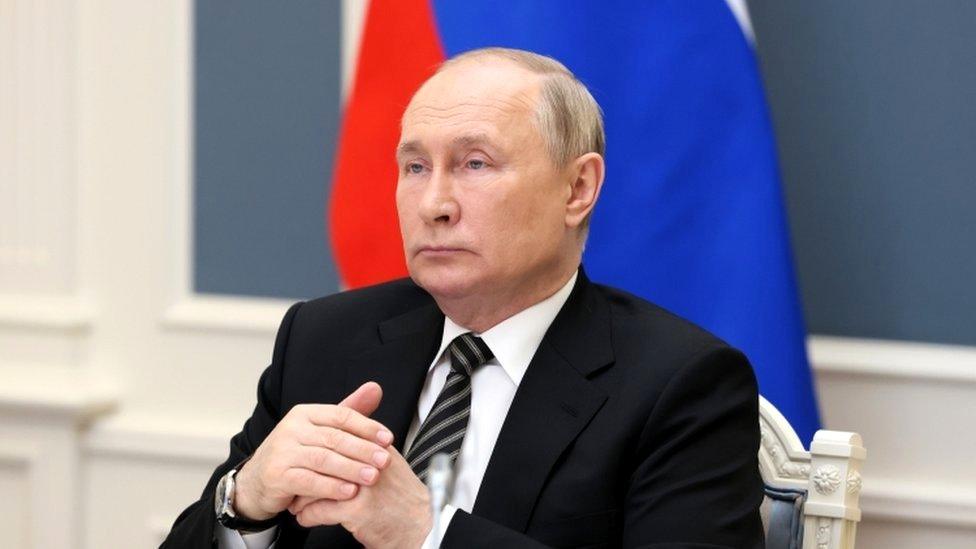
Russia's President Putin may gamble on Western countries suffering from "Ukraine fatigue" and switching focus to their economies
The arguments are heard already in Paris, Berlin and Rome: no need to prolong the war, time to end the global economic pain, let's push for a ceasefire.
This, though, would be opposed by the US, the UK and much of eastern Europe, where policymakers believe Russia's invasion must fail, for the sake of Ukraine and the international order.
So a unilateral Russian ceasefire might change the narrative but not end the fighting.
3: Battlefield stalemate
What if both Ukraine and Russia conclude they cannot achieve more militarily and enter talks for a political settlement?
Their armies are exhausted, running short of manpower and munitions. The price in blood and treasure no longer justifies further fighting. Russia's military and economic losses are not sustainable. The Ukrainian people tire of war, unwilling to risk more lives for an eternally elusive victory.
What if the leadership in Kyiv - no longer trusting continued Western support - decide the time has come to talk? US President Joe Biden openly admits America's aim is for Ukraine, external to be "in the strongest possible position at the negotiating table".
But there may not be a battlefield stalemate for many months and any political settlement would be hard, not least because of Ukraine's lack of trust in Russia. A peace deal might not endure and could be followed by more fighting.
4: A 'victory' for Ukraine
Could Ukraine - against the odds - achieve something close to a victory? Could Ukraine force Russian troops to withdraw to where they were before the invasion?
"Ukraine will definitely win this war," the country's President Volodymyr Zelensky told Dutch TV this week, external.
What if Russia fails to seize all Donbas and suffers more losses? Western sanctions hit Russia's war machine. Ukraine makes counter attacks, using its new long-range rockets, seizing back territory where Russian supply lines are stretched. Ukraine transforms its army from a defensive to an offensive force.
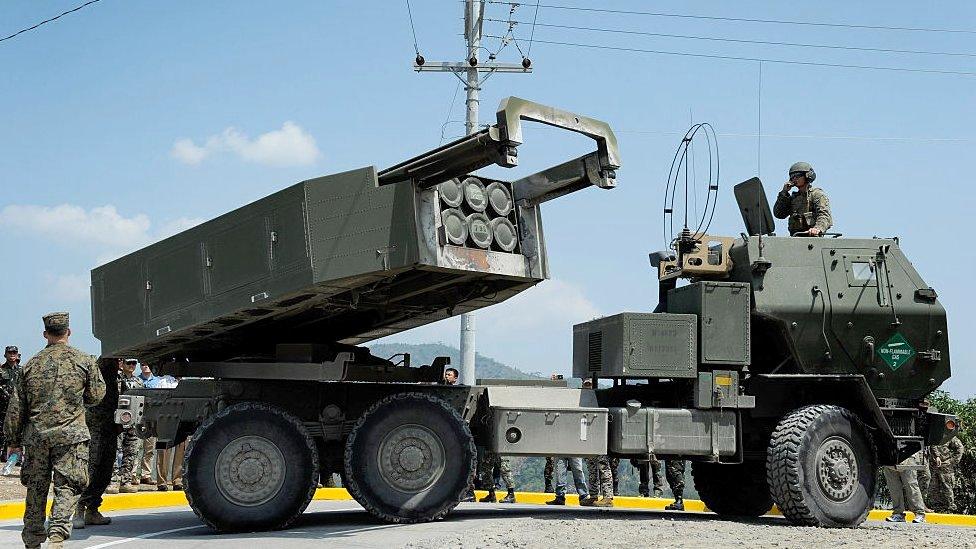
The US said it would supply Ukraine with weapons including medium-range High Mobility Artillery Rocket System (HIMARS)
This scenario is plausible enough for policymakers to worry already about its consequences. If Mr Putin were facing defeat, might he escalate, potentially using either chemical or nuclear weapons?
The historian Niall Ferguson told a seminar at Kings College, London recently: "It seems unlikely to me that Putin is going to accept conventional military defeat when he has a nuclear option."
5: A 'victory' for Russia
And what of a possible Russian "victory"?
Western officials emphasise that Russia, despite early setbacks, still plans to seize the capital Kyiv and subjugate much of Ukraine. "Those maximalist objectives remain in place," one official said.
Russia could capitalise on its gains in Donbas, freeing up forces for use elsewhere, perhaps even targeting Kyiv once again. The sheer weight of Russian numbers come to bear. Ukrainian forces continue to suffer.
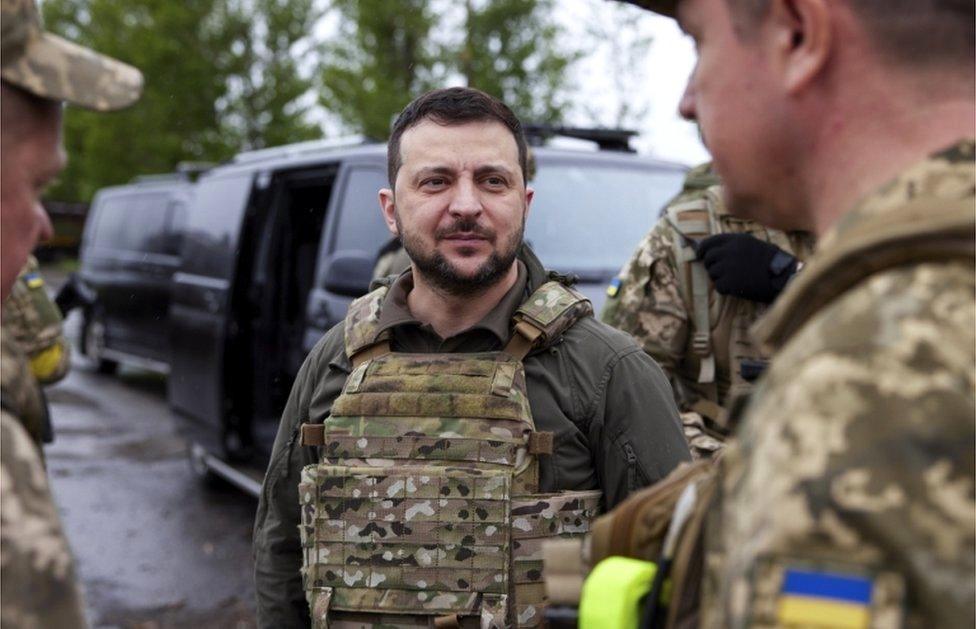
Ukraine's President Zelensky met servicemen in the eastern Kharkiv region, where fighting has intensified
President Zelensky already admits up to 100 Ukrainian soldiers are dying and another 500 are wounded every day, external.
The people of Ukraine could divide, some wanting to fight on, others wanting to sue for peace. Some Western countries might tire of supporting Ukraine. But equally, if they thought Russia was winning, others might want to escalate.
One Western diplomat told me privately the West should test a nuclear weapon in the Pacific as a warning to Russia.
The future of this war is not yet written.
